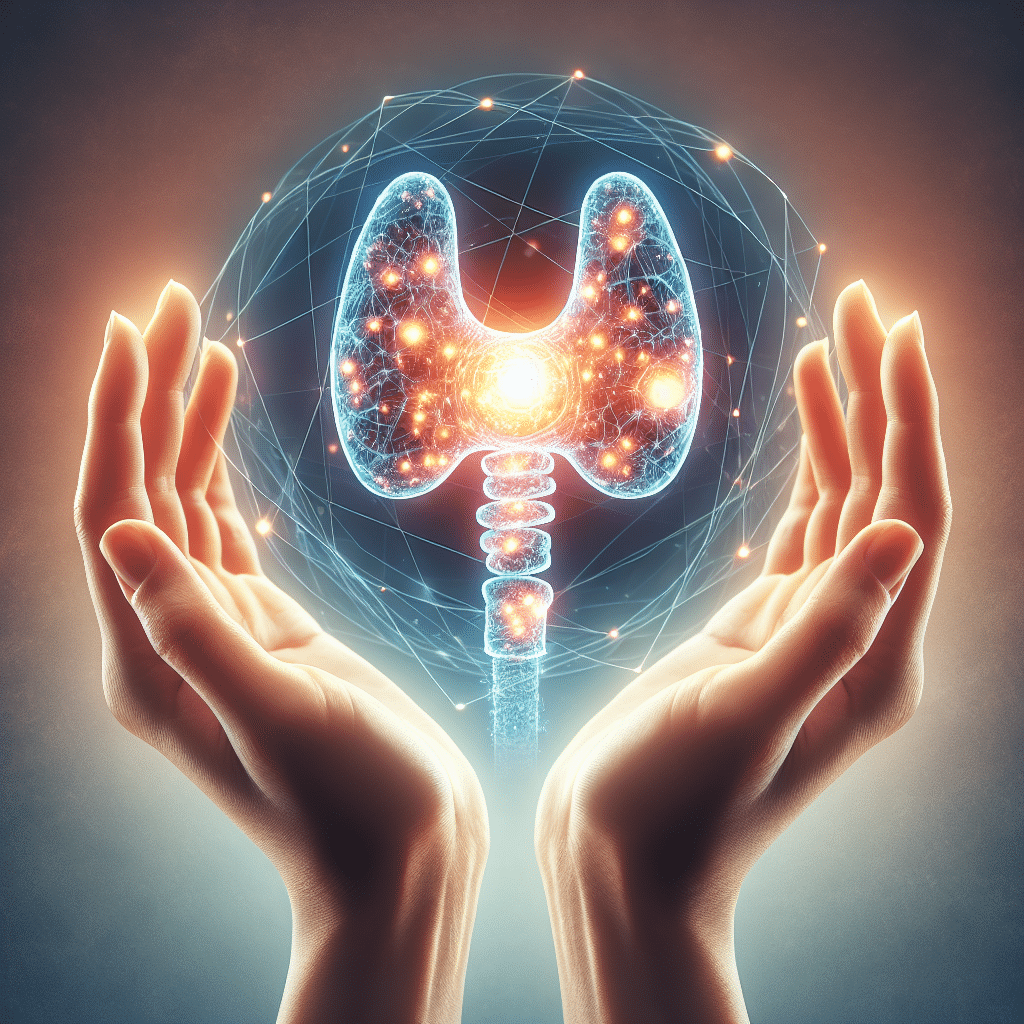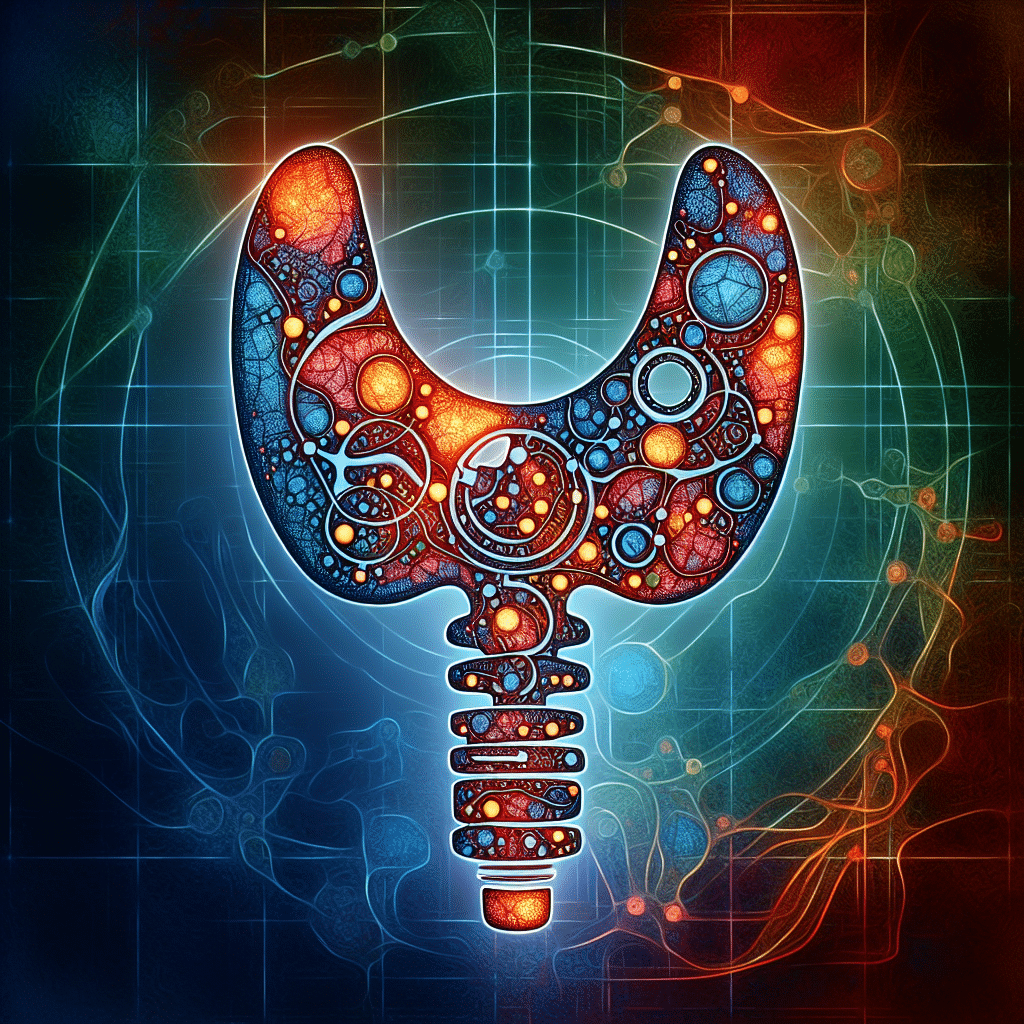In “Jodi Knapp’s Approach: Treating and Reversing Hypothyroidism through Inflammation Reduction,” you will discover a groundbreaking method to control and even reverse the effects of hypothyroidism. Instead of simply addressing the symptoms with medication, Jodi Knapp focuses on reducing inflammation in the body, which is the primary cause of this condition. By detoxifying the body and making simple lifestyle changes, Knapp’s approach offers a natural and effective solution to tackle hypothyroidism at its root. With a strong foundation in researched and validated science, this approach brings hope to those suffering from the debilitating effects of this condition.

Understanding Hypothyroidism
Hypothyroidism is a condition that affects the functioning of the thyroid gland, which is responsible for regulating the body’s metabolism. When the thyroid gland does not produce enough thyroid hormones, it can lead to a variety of symptoms and health problems.
What is hypothyroidism?
Hypothyroidism occurs when the thyroid gland does not produce enough thyroid hormones to meet the body’s needs. This can be caused by various factors, including inflammation, autoimmune disorders, and certain medications. Without an adequate supply of thyroid hormones, the body’s metabolism slows down, leading to a wide range of symptoms.
Common symptoms of hypothyroidism
The symptoms of hypothyroidism can vary from person to person, but some common signs to watch out for include thinning hair, weight gain, mood swings, constipation, fatigue, and difficulty focusing. These symptoms can significantly impact a person’s quality of life and make it challenging to perform everyday tasks. It is essential to recognize these symptoms and seek appropriate treatment to manage the condition effectively.
Conventional Treatment Approach
When it comes to treating hypothyroidism, the conventional approach typically involves prescribing medication to manage the symptoms. Synthetic thyroid hormones, such as levothyroxine, are commonly prescribed to replace the hormones that the thyroid gland is not producing enough of. While this approach can help alleviate the symptoms and normalize hormone levels, it does not address the underlying causes of hypothyroidism.
Medication to manage symptoms
Medication is often the primary method used to manage hypothyroidism. By supplementing the body with synthetic thyroid hormones, the aim is to restore hormone levels to normal and alleviate the symptoms associated with an underactive thyroid. While this approach can be effective, it is essential to note that medication alone does not address the root cause of the condition.
Limitations of conventional treatment
The conventional treatment approach focuses on symptom management rather than addressing the underlying causes of hypothyroidism. This can lead to a reliance on medication and ongoing management of symptoms without achieving long-term resolution. Additionally, medication may come with its own set of side effects and considerations, which can further impact a person’s overall health and well-being.
The Role of Inflammation
Inflammation plays a crucial role in the development and progression of hypothyroidism. Understanding the link between inflammation and thyroid health is vital for effectively managing the condition and working towards its reversal.
Primary cause of hypothyroidism
While there can be various factors contributing to the development of hypothyroidism, inflammation is widely recognized as the primary cause. Inflammation in the body can disrupt the normal functioning of the thyroid gland, leading to a decrease in the production of thyroid hormones. Addressing inflammation is a key aspect of treating and reversing hypothyroidism.
Link between inflammation and thyroid health
Inflammation in the body can directly impact the thyroid gland’s ability to produce and regulate thyroid hormones. When the immune system is overburdened with inflammation, it can mistakenly attack the thyroid tissue, leading to the development of hypothyroidism. Reducing inflammation is crucial for restoring thyroid function and overall health.
Toxins and Inflammation
Excessive toxins in the body can contribute to increased inflammation and, consequently, the development of hypothyroidism. Understanding the impact of environmental and food toxins on the body is essential for addressing the root causes of the condition.
Excess toxins as a common factor
In today’s modern world, we are exposed to a wide range of toxins from various sources. These toxins can come from the environment, such as air pollution and chemicals, as well as from the food we consume, including pesticides and additives. Over time, these toxins can accumulate in the body and contribute to chronic inflammation and other health issues.
Impact of environmental and food toxins
Toxins from our environment and diet can directly impact the immune system and trigger an inflammatory response in the body. This, in turn, can lead to the immune system attacking the thyroid gland and causing hypothyroidism. Understanding the role of toxins in inflammation is crucial for effectively managing and reversing the condition.
How toxins exhaust the immune system
Exposure to toxins can put a significant burden on the immune system, causing it to become overworked and exhausted. As the immune system tries to detoxify the body and combat inflammation, it may become less efficient in maintaining a healthy balance. This can contribute to the development of diseases, including hypothyroidism. Reducing toxin overload is essential to support the immune system and promote overall health.

Understanding Detoxification
Detoxification is a process that helps remove toxins from the body, reducing the burden on the immune system and promoting overall health. Understanding the importance of detoxifying the body is fundamental to managing and reversing hypothyroidism.
Importance of detoxifying the body
Detoxification plays a vital role in supporting the body’s natural detoxification processes and eliminating accumulated toxins. By reducing toxin overload, we can alleviate inflammation, improve immune function, and promote optimal thyroid health. Incorporating detoxification practices into our daily lives is essential for overall well-being.
Benefits of reducing toxin overload
Reducing toxin overload can have numerous benefits for individuals with hypothyroidism. By supporting the body’s natural detoxification mechanisms, we can reduce inflammation, improve hormonal balance, boost energy levels, and enhance overall vitality. Detoxification can be a powerful tool in managing hypothyroidism and promoting long-term health.
The Science behind Jodi Knapp’s Approach
Jodi Knapp, a natural health practitioner, has developed an approach to treating hypothyroidism that focuses on reducing inflammation and detoxifying the body. This approach is grounded in scientific research and offers a comprehensive understanding of the underlying causes of the condition.
Research supporting inflammation reduction
Numerous studies have highlighted the significant role of inflammation in the development and progression of hypothyroidism. By targeting and reducing inflammation, it becomes possible to restore thyroid function and alleviate symptoms. Jodi Knapp’s approach focuses on implementing strategies that have been scientifically proven to reduce inflammation in the body.
Validation of Jodi’s approach
Jodi Knapp’s approach to hypothyroidism has been validated by countless individuals who have successfully reversed their condition using her methods. These success stories serve as real-world evidence of the effectiveness of her approach and provide hope and inspiration for those seeking an alternative to conventional treatment methods.
Scientific basis of lifestyle changes
Incorporating specific lifestyle changes can have a profound impact on reducing inflammation and promoting overall health. Jodi Knapp’s approach emphasizes dietary changes aimed at reducing inflammation, implementing detoxification methods to eliminate toxins, incorporating specific supplements and nutrients for thyroid health, managing stress levels, and engaging in regular exercise. These lifestyle changes are supported by scientific research and provide a well-rounded approach to addressing the root causes of hypothyroidism.

Key Elements of Jodi Knapp’s Approach
Jodi Knapp’s approach to treating and reversing hypothyroidism encompasses various key elements that work synergistically to promote optimal thyroid health and overall well-being.
Dietary changes to reduce inflammation
Diet plays a significant role in inflammation and overall health. Jodi Knapp’s approach focuses on incorporating anti-inflammatory foods into the diet while eliminating or reducing foods that contribute to inflammation. By nourishing the body with nutrient-dense, whole foods, we can support the reduction of inflammation and promote optimal thyroid function.
Detoxification methods recommended by Jodi
Detoxification is a crucial aspect of Jodi Knapp’s approach. Her methods involve implementing specific detoxification practices that help remove accumulated toxins from the body and support the body’s natural detoxification processes. These methods can range from incorporating certain foods and herbs to practicing techniques such as dry brushing and hydrotherapy.
Supplements and nutrients for thyroid health
Supplementation can be an essential component of managing hypothyroidism. Jodi Knapp recommends specific supplements and nutrients that are known to support thyroid health and reduce inflammation. These supplements can help fill any nutritional gaps and provide the body with the necessary tools to restore thyroid function.
Stress management techniques
Managing stress is crucial for individuals with hypothyroidism, as stress can significantly impact thyroid function and contribute to inflammation. Jodi Knapp’s approach includes various stress management techniques, such as meditation, deep breathing exercises, and mindfulness practices. By incorporating these techniques into our daily lives, we can better manage stress and support overall well-being.
Exercise and its impact on inflammation
Regular exercise is an important aspect of Jodi Knapp’s approach. Physical activity helps reduce inflammation, improve hormonal balance, and support overall health. Engaging in activities such as yoga, walking, or strength training can have a profound impact on thyroid health and inversely affect inflammation.
Success Stories: Jodi Knapp’s Method in Action
The effectiveness of Jodi Knapp’s approach to treating hypothyroidism is reflected in the success stories of individuals who have successfully reversed their condition using her methods.
Real-life experiences of hypothyroidism reversal
People from all walks of life have shared their experiences of successfully reversing their hypothyroidism using Jodi Knapp’s approach. These individuals have experienced significant improvements in their symptoms, regained their energy levels, and achieved an overall improvement in their quality of life. Their stories serve as a testament to the power of addressing the root causes of hypothyroidism through a comprehensive approach.
Testimonials from Jodi’s clients
Client testimonials have poured in, praising Jodi Knapp’s approach for its effectiveness and life-changing impact. Clients have reported improved hormone levels, weight loss, increased energy, and a sense of well-being after implementing the strategies outlined by Jodi. These testimonials highlight the transformative results that can be achieved with the right approach to managing hypothyroidism.
Implementing Jodi Knapp’s Approach
Implementing Jodi Knapp’s approach to managing hypothyroidism can be a transformative journey towards healing and reversing the condition. Here is a step-by-step guide to getting started:
Step-by-step guide to getting started
- Educate yourself: Gain a comprehensive understanding of the underlying causes of hypothyroidism and the principles behind Jodi Knapp’s approach.
- Assess your current lifestyle: Evaluate your diet, exercise routine, stress levels, and exposure to toxins to identify areas that need improvement.
- Make dietary changes: Incorporate anti-inflammatory foods and eliminate or reduce foods that contribute to inflammation.
- Incorporate detoxification practices: Implement specific detoxification methods recommended by Jodi Knapp to support the elimination of toxins from your body.
- Introduce supplements and nutrients: Consult with a healthcare professional to determine the appropriate supplements and nutrients to support your thyroid health.
- Manage stress: Incorporate stress management techniques into your daily routine, such as meditation, deep breathing exercises, or journaling.
- Engage in regular exercise: Find physical activities that you enjoy and make them a regular part of your routine.
- Monitor your progress: Keep track of your symptoms, energy levels, and overall well-being to assess the effectiveness of the approach.
- Seek professional guidance and support: Consult with a healthcare professional who specializes in natural therapies and can provide guidance and support throughout your journey.
Challenges and how to overcome them
Embarking on a new approach to managing hypothyroidism can come with its own set of challenges. It’s important to remember that progress takes time, and individual responses may vary. If you encounter difficulties along the way, consider seeking support from healthcare professionals who can provide personalized guidance and address any concerns or questions you may have.
Long-term Maintenance and Support
Sustaining a healthy lifestyle and monitoring thyroid health are vital for long-term maintenance and support after successfully managing and reversing hypothyroidism.
Sustaining a healthy lifestyle
Once you have implemented the necessary lifestyle changes and achieved improvements in your hypothyroidism, it is important to maintain a healthy lifestyle to ensure optimal thyroid health. This includes continuing to eat a nutrient-dense, anti-inflammatory diet, engaging in regular exercise, managing stress, and reducing toxin exposure.
Monitoring thyroid health
Regular monitoring of thyroid function is essential to ensure that your thyroid health remains stable. This can be done through routine blood tests to check hormone levels and other markers of thyroid function. By staying proactive and vigilant, you can identify any potential issues early on and take appropriate measures to address them.
Seeking professional guidance and support
It is highly recommended to seek professional guidance and support throughout your journey of managing and reversing hypothyroidism. A healthcare professional specializing in natural approaches can provide ongoing guidance, monitor your progress, adjust protocols as needed, and address any concerns that may arise.
In conclusion, understanding hypothyroidism and its underlying causes is crucial for effectively managing and reversing the condition. Jodi Knapp’s approach offers a comprehensive, science-based strategy that focuses on reducing inflammation, eliminating toxins, and supporting overall health. By implementing targeted lifestyle changes and seeking professional guidance, individuals with hypothyroidism can take control of their health and achieve long-term well-being.


